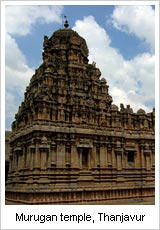Introduction:
The city of Thanjavur is known as the "rice bowl of Tamil
Nadu". The city gained in importance in the reign of
Chola Kings who made it their capital. The Nayaks and the
Maratha Kings followed later and the influence of all these
rulers showed in the form of great monuments in the city.
The temples of Thanjavur are unique in their own right. Thanjavur
was the ancient capital of the Chola kings whose origins,
go back to the beginning of the Christian era. Power struggles
between these groups were a constant feature of their early
history, with one or other gaining the ascendancy at various
times. The Cholas' turn for empire building came between 850
and 1270 AD and , at the height of their power. Probably the
greatest chola emperors were Raja Raja who was responsible
for building the Brihadishwara Temple ( Thanjavur main attraction
) and his son Rajendra-I whose navy competed with the Arabs
for controls of the Indian Ocean trade routes and who was
responsible for bringing Srivijaya under Chola control. A
demon by the name of Tanjan-an asura lends its name to the
terrific town of Thanjavur. As per the legend the last wish
of the demon was that the place should be named after him,
Sri Anandavalli Amman and Sri Neelamegapperumal granted it.
Sightseeing:
Brihadeshwara Temple & Fort:
The temple is an outstanding example of Chola architecture
and was built by the great Chola King, Raja Raja I in the
10th century. The granite block that forms the cupola on the
top is monolithic and dominates the nearby areas.
The art gallery:
The art gallery occupies the Nayak Durbar Hall. It has a superb
collection of Chola bronze statues from the 9th to 12th centuries.
The Saraswati mahal Library is next door to the gallery. Over
30,000 Indian and European manuscripts written on palm leaves
and paper are preserved in the Saraswati Mahal Library.
Saraswathi Mahal Library :
It is situated in one section of the palace where there are
over 3000 palm leaf and paper manuscripts in Indian as well
as European languages.
Thanjavur Palace & Museum:
Thanjavur paintings basically signify paintings created using
a style and technique, which originated in Thanjavur during
the maratha period in the 16th century. A typical Thanjavur
painting would consist of one main figure, a deity, with a
well-rounded body & almond shaped eyes. This figure would
be housed in an enclosure created by means of an arch, curtains
etc. The painting would be made by the gilded and gem-set
technique - a technique where gold leaves & sparkling
stones are used to highlight certain aspects of the painting
like ornaments, dresses etc. The painting would be bright
& colourful and breathtakingly beautiful. The impact in
a darkened room is that of a glowing presence. While most
of the paintings would depict the Child Krishna and his various
pranks, paintings of other deities were also created.
Over a period of time changes have occurred in the stylization
- for example, the figures are no longer round. Presiding
deities of various famous temples are also being depicted
in the paintings. The technique is now more in use than the
style.
TOURISTS ATTRACTIONS:
Thanjavur has as many as 74 temples but the most superb is
the Sri Brihadeswara temple. The temple dedicated to Nandi,
the Bull is a masterpiece of the captivating Chola architecture.
The mount of Lord Shiva i.e. Nandi has been made from a single
granite rock. Similarly the dome of the temple rests on one
granite rock. The Chola king Raja Raja I built the Brihadeswara
temple way back in the 10th century AD. The architecture of
the temple is simply put beautiful and wondrous the best amongst
the many in the temple town of Thanjavur. The Brihadeswara
temple stands 216 ft. tall but it has been built in such a
manner that throughout the day its shadow never falls on the
ground! The big temple is home to the 12 feet tall, 191/2
feet long, 81/4 feet wide Nandi weighing approximately 25
tons.
|
|
 |

